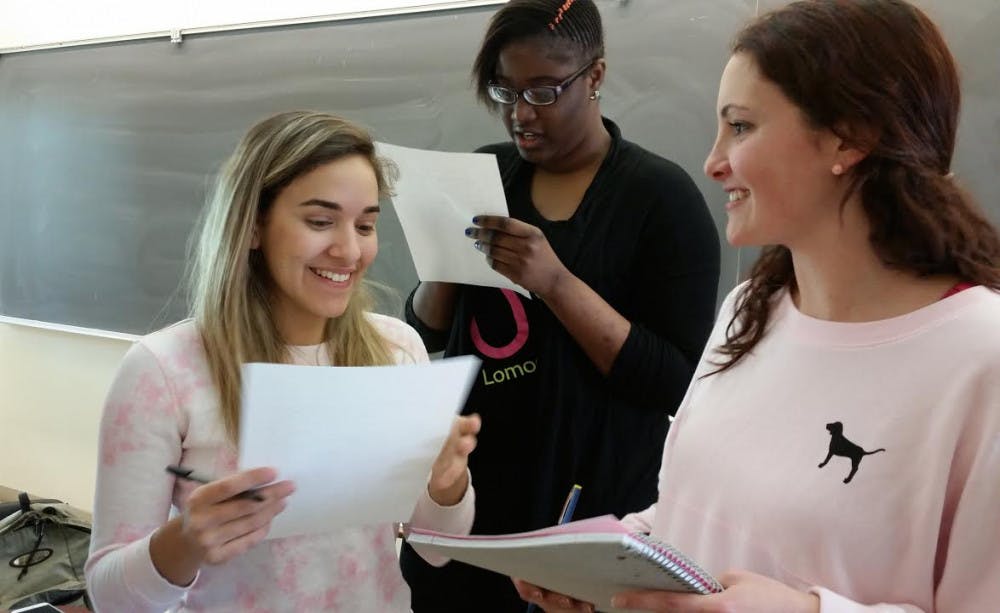By Sydney Shaw
News Editor
In a collaborative oral proficiency hour between international and communication studies students, a game of “human bingo” sparked a class-wide conversation about students’ families, hobbies and hometowns — proving that individuals from countries around the world are more alike than not.

Students from the English as a Second Language (ESL) program and from Professor Yifeng Hu’s Intercultural Communication class (COM 411) came together to practice language skills and learn about other cultures on Wednesday, March 4.
Led by junior Spanish major Eileen Goepfert, the oral proficiency hour brings together international students from Brazil to West Africa.
Goepfert passed out a human bingo grid containing statements such as “someone who can speak three languages,” “someone who wants to be a teacher” and “someone who likes to watch American football.” Students then had the opportunity to walk around the room, chatting with individuals from other countries to find peers who fit the categories on the bingo board.
Freshman biology and secondary education double major Kadidia Sylla shared that she can speak four languages — English, French, Arabic and Bambara, a language spoken in her home country, Mali.
“Bingo is the same here as it is in Mali,” Sylla said. Iago Duarte, a junior nursing major, said the game is played in Brazil, as well.
During the bingo game, Vinicius de Azevedo Siqueira, a senior studying at the College this year from Brazil, told classmates that he wants to be a civil engineer.
“All of the Brazilian students are here on a scholarship from their government,” Goepfert explained. “Most of them are studying science or engineering.”
The next activity was speed dating, where pairs of individuals stood in a circle and were asked to spend one-minute answering a question.
When Goepfert asked students to talk about a “book that changed you,” Duarte shared that he loves reading the “Harry Potter” series — a hobby that many American students from Hu’s class shared.
“We’re all different, but we’re all similar, too,” Goepfert said.
Communication students from Hu’s class utilized the meeting between classes as a way to learn about other countries and to teach visiting students about American culture.
“It was great that we were able to talk to students from different countries so we could see the similarities and differences amongst us,” senior communication studies major Sydnee Weinbaum said. “I was able to interact with people of different cultures and share with them American customs, as well.”
Hu’s course stresses the importance of developing one’s ability to communicate effectively with people from diverse cultures and appreciate various ways people differ from each other.
“By interacting with international students, my students were able to apply the knowledge and skills they have learned in the class,” Hu said. “I think it enhances students’ intercultural communication competence.”
International students used the meeting as an opportunity to practice their English.
“These students are so motivated to learn English,” Goepfert said. “I thank my lucky stars every day that I was born in this country and grew up speaking the language. I think English is the hardest language to learn.”
But according to Hu’s students, it was nearly impossible to tell that English is not these students’ first language.
“They speak so well,” said Jenna Fleck, a junior communication studies major in Hu’s class. “It’s really interesting to get one-on-one time with people from other cultures that you wouldn’t normally get to talk to.”
ESL coordinator Amy Moyer plans on arranging similar meetings between ESL and communication studies classes in the future.
“It was a really productive collaboration between the two classes,” Moyer said. “I think we should definitely plan for more. It really is a win-win situation for both groups.”
During the oral proficiency meeting, Hu — who was born in China — reflected on her time at Penn State University, where she received her Ph.D. degree.
“In the ESL classes for international students there, we didn’t really get to talk to the natives, so this would have been a great opportunity,” she said.
Many of the international students at the College also spoke about how the collaboration between the classes was an uncommon, yet beneficial, experience.
“It’s so important when you live abroad to talk to the people in the culture you are living in,” said Jeymyson Alves de Sousa, a student from Brazil. “But it’s hard because it’s easier to talk to each other in our native language. So this was a nice opportunity to talk to Americans.”







